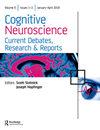Can we distinguish mixed from ambiguous emotions and morality?
IF 2.2
4区 医学
Q3 NEUROSCIENCES
引用次数: 0
Abstract
The neurocognitive model of Mixed and Ambiguous Emotions and Morality (MA-EM) makes a relevant case for putting non-unidimensional emotions and morality more prominently on the research agenda. However, existing research challenges its assumptions about the distinction between mixed and ambiguous emotions and morality, and how they relate to reflective versus simulative processing routes, in three respects. First, the emotional state of being moved is generally conceptualized as a non-ambiguous rather than an ambiguous emotion. Second, mixed emotions have been found to elicit reflection rather than simulation. Third, the morality of narrative characters is typically perceived as mixed rather than ambiguous.
我们能区分混杂的、模棱两可的情感和道德吗?
混合和模糊情绪和道德(MA-EM)的神经认知模型为将非单向度的情绪和道德放在研究议程的突出位置提供了相关的案例。然而,现有的研究在三个方面挑战了其关于混合和模糊情绪与道德之间区别的假设,以及它们如何与反思与模拟加工路线相关联。首先,被感动的情绪状态通常被概念化为一种非模棱两可的情绪,而不是一种模棱两可的情绪。其次,人们发现,复杂的情绪会引发反思,而不是模拟。第三,叙事角色的道德通常被认为是混合的,而不是模糊的。
本文章由计算机程序翻译,如有差异,请以英文原文为准。
求助全文
约1分钟内获得全文
求助全文
来源期刊

Cognitive Neuroscience
NEUROSCIENCES-
CiteScore
3.60
自引率
0.00%
发文量
27
审稿时长
>12 weeks
期刊介绍:
Cognitive Neuroscience publishes high quality discussion papers and empirical papers on any topic in the field of cognitive neuroscience including perception, attention, memory, language, action, social cognition, and executive function. The journal covers findings based on a variety of techniques such as fMRI, ERPs, MEG, TMS, and focal lesion studies. Contributions that employ or discuss multiple techniques to shed light on the spatial-temporal brain mechanisms underlying a cognitive process are encouraged.
 求助内容:
求助内容: 应助结果提醒方式:
应助结果提醒方式:


